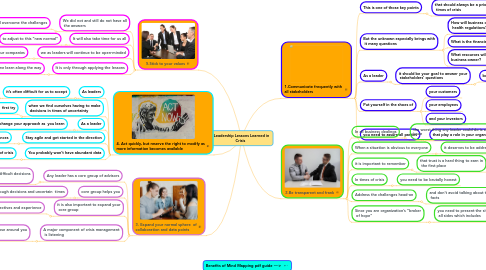
1. 3. Expand your normal sphere of collaboration and data points
1.1. Any leader has a core group of advisors
1.1.1. to lean on when difficult decisions must be made
1.2. core group helps you
1.2.1. to walk through decisions and uncertain times
1.3. it is also important to expand your core group
1.3.1. to include new perspectives and experience
1.3.1.1. especially during times that require new opinions and experiences
1.4. A major component of crisis management is listening
1.4.1. you should listen to those around you who can provide
1.4.1.1. different perspectives
1.4.1.2. and recommendations for how to approach the unknown
2. 4. Act quickly, but reserve the right to modify as more information becomes available
2.1. As leaders
2.1.1. it’s often difficult for us to accept
2.1.1.1. that we don’t have all the answers
2.2. when we find ourselves having to make decisions in times of uncertainty
2.2.1. we want to do the right thing on the first try
2.3. As a leader
2.3.1. it is okay to change your approach as you learn
2.4. Stay agile and get started in the direction
2.4.1. that is best suited for current circumstances
2.4.1.1. and figure the rest out as you go
2.5. You probably won’t have abundant data
2.5.1. to go off of when it comes to a time of crisis
2.5.1.1. and what you decide will likely change as more data is revealed
3. 5.Stick to your values
3.1. We did not and still do not have all the answers
3.1.1. for how we will overcome the challenges
3.1.1.1. associated with a global health crisis
3.2. It will also take time for us all
3.2.1. to adjust to this “new normal"
3.3. we as leaders will continue to be open-minded
3.3.1. as we learn to manage our companies
3.3.1.1. under these new circumstances
3.4. It is only through applying the lessons
3.4.1. that we learn along the way
3.4.1.1. that we can truly become “brokers of hope”.
4. Benefits of Mind Mapping pdf guide ---->
5. 1.Communicate frequently with all stakeholders
5.1. This is one of those key points
5.1.1. that should always be a priority in times of crisis
5.2. But the unknown especially brings with it many questions
5.2.1. How will business continue under new health regulations?
5.2.2. What is the financial state of the business?
5.2.3. What resources will be made available to help me succeed as a business owner?
5.3. As a leader
5.3.1. it should be your goal to answer your stakeholders’ questions
5.3.1.1. before they even ask them
5.4. Put yourself in the shoes of
5.4.1. your customers
5.4.2. your employees
5.4.3. and your investors
5.5. you need to assure all parties
5.5.1. that play a role in your organization
5.5.1.1. that you’re trying to stay at least one step ahead of the issues
6. 2.Be transparent and frank
6.1. In all business dealings
6.1.1. the worst thing any leader could do is sidestep an important issue
6.1.1.1. to maintain the calm of its people
6.2. When a situation is obvious to everyone
6.2.1. it deserves to be addressed
6.3. it is important to remember
6.3.1. that trust is a hard thing to earn in the first place
6.3.1.1. but a near-impossible thing to win back if lost
6.4. In times of crisis
6.4.1. you need to be brutally honest
6.5. Address the challenges head-on
6.5.1. and don’t avoid talking about the important facts
6.5.1.1. just because it’s uncomfortable
6.6. Since you are organization’s “broker of hope"
6.6.1. you need to present the situation from all sides which includes
6.6.1.1. your intended approach to address the negative with promising next steps
